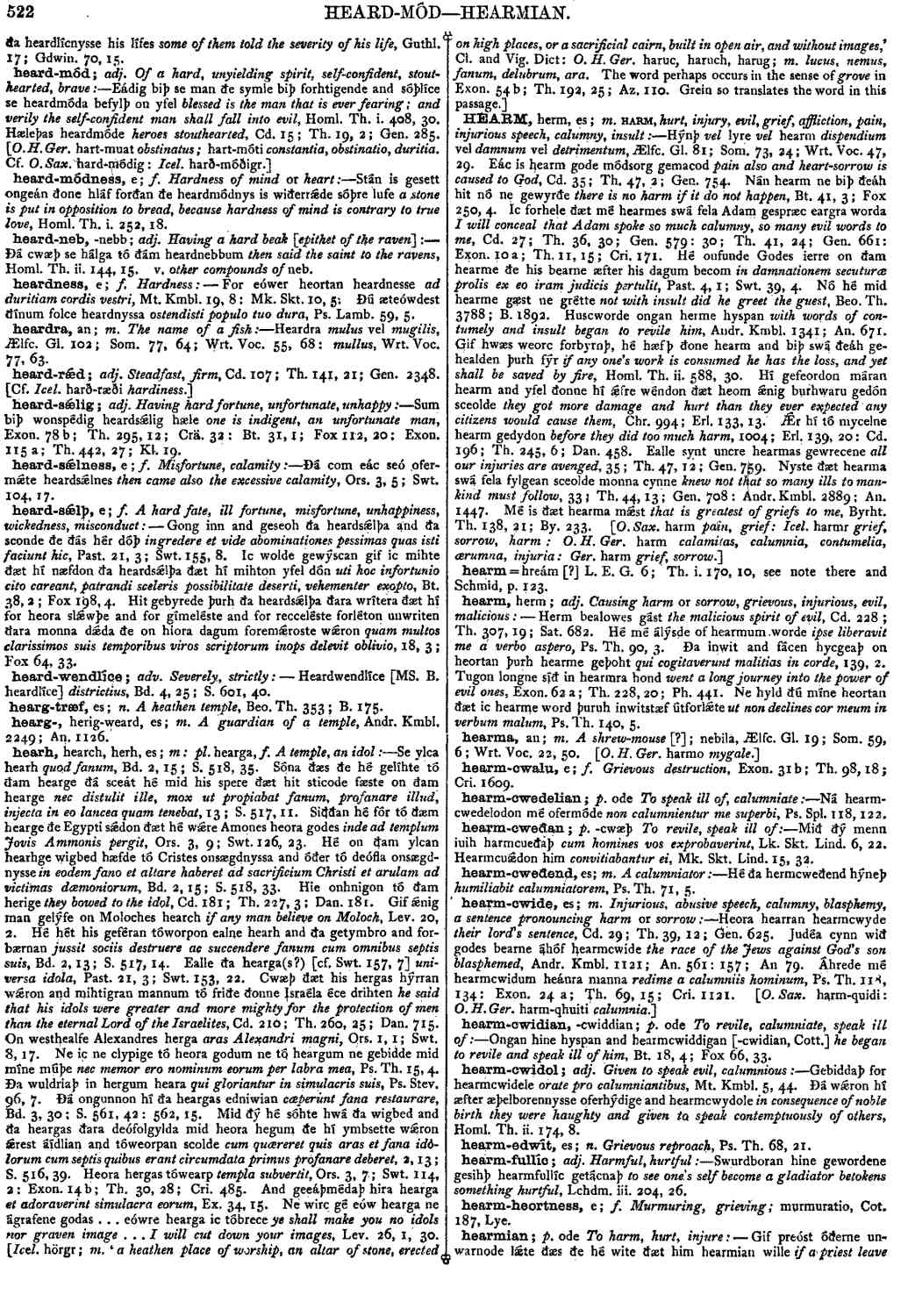HEARM
- noun [ masculine ]
-
Hýnþ vel lyre vel hearm dispendium vel damnum vel
detrimentum,
- Ælfc. Gl. 81; Som. 73, 24; Wrt. Voc. 47, 29.
-
Eác is hearm gode módsorg gemacod
pain also and heart-sorrow is caused to God,
- Cd. 35; Th. 47, 2; Gen. 754.
-
Nán hearm ne biþ ðeáh hit nó ne gewyrðe
there is no harm if it do not happen,
- Bt. 41, 3; Fox 250, 4.
-
Ic forhele ðæt mé hearmes swá fela Adam gespræc eargra worda
I will conceal that Adam spoke so much calumny, so many evil words to me,
- Cd. 27; Th. 36, 30; Gen. 579: 30; Th. 41, 24; Gen. 661: Exon. 10 a;
Th. 11, 15; Cri. 171.
-
Hé onfunde Godes ierre on ðam hearme ðe his bearne æfter his dagum becom
in damnationem secuturæ prolis ex eo iram judicis pertulit,
- Past. 4, 1; Swt. 39, 4.
-
Nó hé mid hearme gæst ne grétte
not with insult did he greet the guest,
- Beo. Th. 3788; B. 1892.
-
Huscworde ongan herme hyspan
with words of contumely and insult began to revile him,
- Andr. Kmbl. 1341; An. 671.
-
Gif hwæs weorc forbyrnþ, hé hæfþ ðone hearm and biþ swá ðeáh gehealden þurh fýr
if any one's work is consumed he has the loss, and yet shall be saved by fire,
- Homl. Th. ii. 588, 30.
-
Hí gefeordon máran hearm and yfel ðonne hí ǽfre wéndon ðæt heom ǽnig burhwaru gedón sceolde they got more damage and hurt than they ever expected any citizens would cause them, Chr. 994; Erl. 133, 13.Ǽr hí tó mycelne hearm gedydon
before they did too much harm,
- 1004; Erl. 139, 20: Cd. 196; Th. 245, 6; Dan. 458.
-
Ealle synt uncre hearmas gewrecene
all our injuries are avenged,
- 35; Th. 47, 12; Gen. 759.
-
Nyste ðæt hearma swá fela fylgean sceolde monna cynne
knew not that so many ills to mankind must follow,
- 33; Th.44, 13; Gen. 708: Andr. Kmbl. 2889; An. 1447.
-
Mé is ðæt hearma mǽst
that is greatest of griefs to me,
- Byrht. Th. 138, 21; By. 233.
Bosworth, Joseph. “HEARM.” In An Anglo-Saxon Dictionary Online, edited by Thomas Northcote Toller, Christ Sean, and Ondřej Tichy. Prague: Faculty of Arts, Charles University, 2014. https://bosworthtoller.com/18497.
Checked: 0